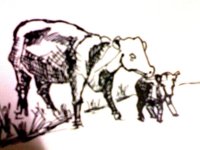August 2010

Ente etabani etwara omwana gwayo haihi n’omuhanda. (Hema)
Ngombe mjinga hupeleka ndama karibu ya barabara. (Swahili)
Une vache stupide conduit le veau tout près du chemin. (French)
A stupid cow leads her calf near the road. (English)
Background, Explanation, Meaning and Everyday Use
Hema is spoken by the Bahema of Ituri in the North Eastern part of the Democratic Republic of Congo (DRC) bordering Uganda to the East and Sudan to the North. The Bahema are great pastoralists, but there are some clans that are renowned for their fishing prowess on Lake Albert. Agriculture is also practiced, but not at large scale. Many Bahema are also engaged in trade and business. The Hema language is close to Orunyoro, Orutoro and Ankole in Uganda.
Keeping the kraal in order requires discipline not only from the herdsman and his family but also from the animals. In the morning or evening the owner of the cows or the person in charge squats near the door of his hut to watch the milking. Cows are brought in turn near the fire and a boy or the person assisting allows its calf to suck a little until the milk can flow freely. After this the calf is pulled back and held in front of the cow while the milkman is milking as much as he thinks desirable. The milk is given to the family members and can be sold to other people if there is enough quantity. Butter which is the product of milk is used for cooking, for smearing upon the body and for rubbing into every article made of skin to keep it soft. In short, the family expects a lot from a cow in a pastoral community.
Nevertheless, a cow that was not well trained when it was young will become disobedient and stupid. In the morning the herd is taken outside to allow the women (abagole) to clean up the kraal by throwing away the dung. The same dung when dried up will be used to make fire for the cattle in the evening and for fertilizing the soil where bananas, beans, pumpkins, etc. are planted. At around 9 a.m. the herd is taken to pasture by the herdsman who plays a traditional flute to please the herd, while the calves are kept in a special hut for the day and are released in the evening when the mother cows come back. After sucking they are led back to their hut where they spend the night. But a stupid mother can endanger the life of its calf by leading it near the road.
Biblical Parallels
In Proverbs 1:17 lack of discipline is associated with folly and lack of wisdom. Proverbs 29:15 (KJV) says: “The rod of reproof gives wisdom, but a child left to himself or herself brings his mother to shame.” Proverbs 14:1 (NVSV) says: “The wise woman builds her house, but the foolish tears it down with her own hands.”
Contemporary Use and Religious Application
 Education and training are crucial in society. Future leaders should be educated in the fear of the Lord. The correct way of serving the community and the family comes from for unconditional love for God and the neighbor. We find many leaders who had made wonderful promises to work for their people, but fail to do it because they did not have a genuine love for God. Thus, those supposed to bring security and prosperity are the one responsible for the misery of our society. In this last decade many African countries have known wars, famine, disintegration and countless miseries as result of bad leadership, poor governance, corruption, despotism, and disrespect for human dignity and so on. Bad leadership is also seen in families where some parents have neglected their children who usually end by being thrown in the streets as prostitutes, bandits, drug dealers etc.
Education and training are crucial in society. Future leaders should be educated in the fear of the Lord. The correct way of serving the community and the family comes from for unconditional love for God and the neighbor. We find many leaders who had made wonderful promises to work for their people, but fail to do it because they did not have a genuine love for God. Thus, those supposed to bring security and prosperity are the one responsible for the misery of our society. In this last decade many African countries have known wars, famine, disintegration and countless miseries as result of bad leadership, poor governance, corruption, despotism, and disrespect for human dignity and so on. Bad leadership is also seen in families where some parents have neglected their children who usually end by being thrown in the streets as prostitutes, bandits, drug dealers etc.
NOTE: This is No. 36 in Hema Proverbs (Enfumo Ezabahema) — a Collection and Interpretation of Hema Proverbs in English, Swahili and French by Calvin C. Katabarwa. August, 2010. This is one booklet in the series of Endangered African Proverbs Collections. It is posted as an ebook on our website at: http://afriprov.org/index.php/resources/e-books.html
Pastor Calvin Chelo Katabarwa
P. O. Box 61591
00200 Nairobi, Kenya
Cellphone: 0734-829002
Email: ckatabarwa@yahoo.com
Illustrations provided by:
Professor Cephas Yao Agbemenu
Department of Fine Arts
Kenyatta University
P.O. Box 43844
Nairobi, Kenya
Cellphone: 0723-307992
Email: cyagbemenu@yahoo.com

